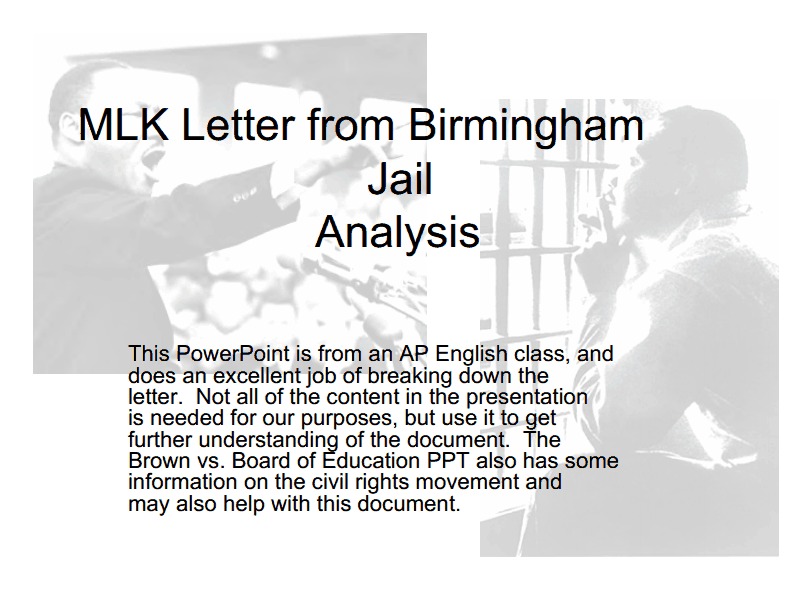-
Letter From Birmingham Jail Summary카테고리 없음 2020. 1. 23. 19:55


Letter from a Birmingham Jail: Five Main Points. This point is summarized in his famous statement, “Injustice anywhere is a threat to justice everywhere.” The second point that Dr. King’s letter makes is that when we address problems in society, we must address the underlying causes of those problems. How can the answer be improved?

In the past, the African American community has attempted to negotiate with Birmingham community leaders, but had their hopes dashed. King cites the local merchants’ promise to remove their “humiliating racial signs” that established and supported segregation in downtown stores, in exchange for a moratorium on political demonstrations. Only a few merchants actually took down their signs, and even then, some put them back up after a while. This convinced the African American community that they needed to take direct action through civil disobedience. To give his readers an idea of the racial injustice African Americans have experienced, King offers a list of injustices. He presents examples of lynchings and extreme police brutality, the “air-tight cage of poverty,” and the emotional pain of explaining segregation to his young daughter, only to see “ominous clouds of inferiority beginning to form in her little mental sky.” He delves into the psychological effects of being a second-class citizen in his own country and concludes that he can no longer wait for change to happen on its own and must go out and make it happen.
Martin Luther King, Jr. Wrote his “Letter from Birmingham Jail” in response to criticism of the nonviolent protests in Birmingham, Alabama in April 1963. In the letter, King responds specifically to a statement published in a local newspaper by eight white clergymen, calling the protests “unwise and untimely” and condemning to the “outsiders” who were leading them.He begins his letter by calling the clergymen people of “genuine goodwill” and acknowledging the sincerity of their concern, setting a tone of reasonable dialogue. He then responds to the claims that he is an outsider by informing his critics that as the leader of the Southern Christian Leadership Conference, he was invited to Birmingham to support the African American residents fight for their civil rights. Beyond that, he argues that he is in Birmingham “because injustice is here,” and like the Apostle Paul and other early Christians, he must answer the call for aid.King also rebuts the critics’ argument that segregation laws should be fought in the courts and not on the streets, explaining that only through direct action can they force the white majority to confront the issue of racism and enter into true dialogue. While the protesters are breaking laws—which is precisely why King must write his letter from the Birmingham City jail—those laws are immoral and unjust, and civil disobedience is thus a patriotic response.In addition to responding directly to the criticisms brought forth by the clergymen, King uses his letter to make his own judgments as well. He expresses his extreme disappointment at white moderates, whom he considers more detrimental to the cause of racial equality than the Ku Klux Klan.
Summary and Definition: The Letter from Birmingham Jail by Martin Luther King, Jr. Was written on April 16, 1963 and is the most eloquent and profound defense.
Summary Of Letter From Birmingham Jail Essay
Letter From Birmingham Jail Summary Response
He condemns the fact that the moderate claims to support the mission while rejecting all attempts at direct action. He would rather be considered an extremist “for the cause of justice” than stand by and passively allow those injustices to persist, as the white moderate has done in the South.King then extends his criticism to the leadership of the white church for championing the status quo. He expected more of the church, an institution that once “transformed the mores of society,” but laments the fact that the contemporary church has fallen far from its early Christian origins to become “an irrelevant social club” rather than a source of inspiration. Yet with all of his concern about the lack of support for the cause of racial equality and desegregation, King closes his letter on a hopeful note, expressing his belief that African Americans will achieve the freedom and equality they are fighting for.
